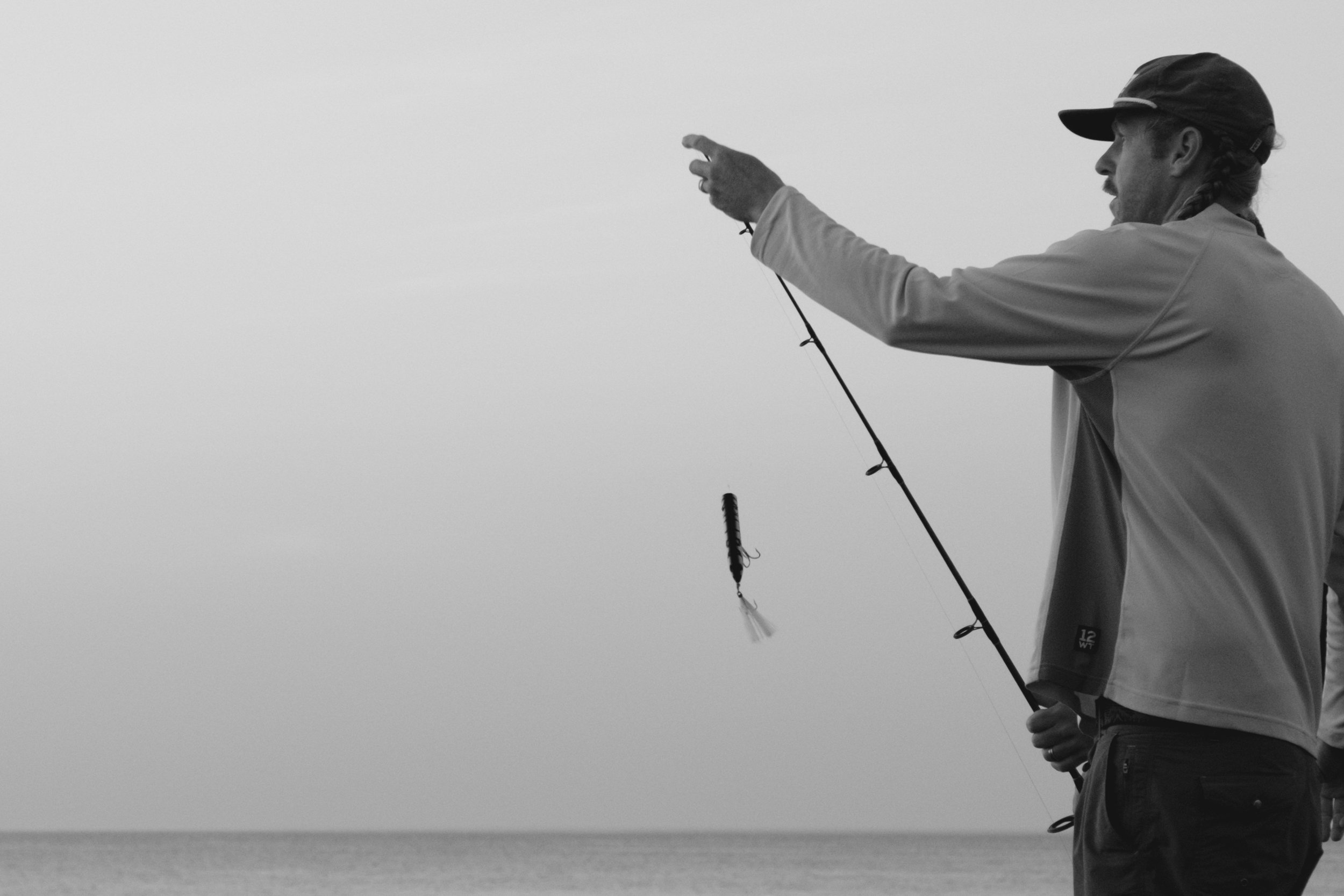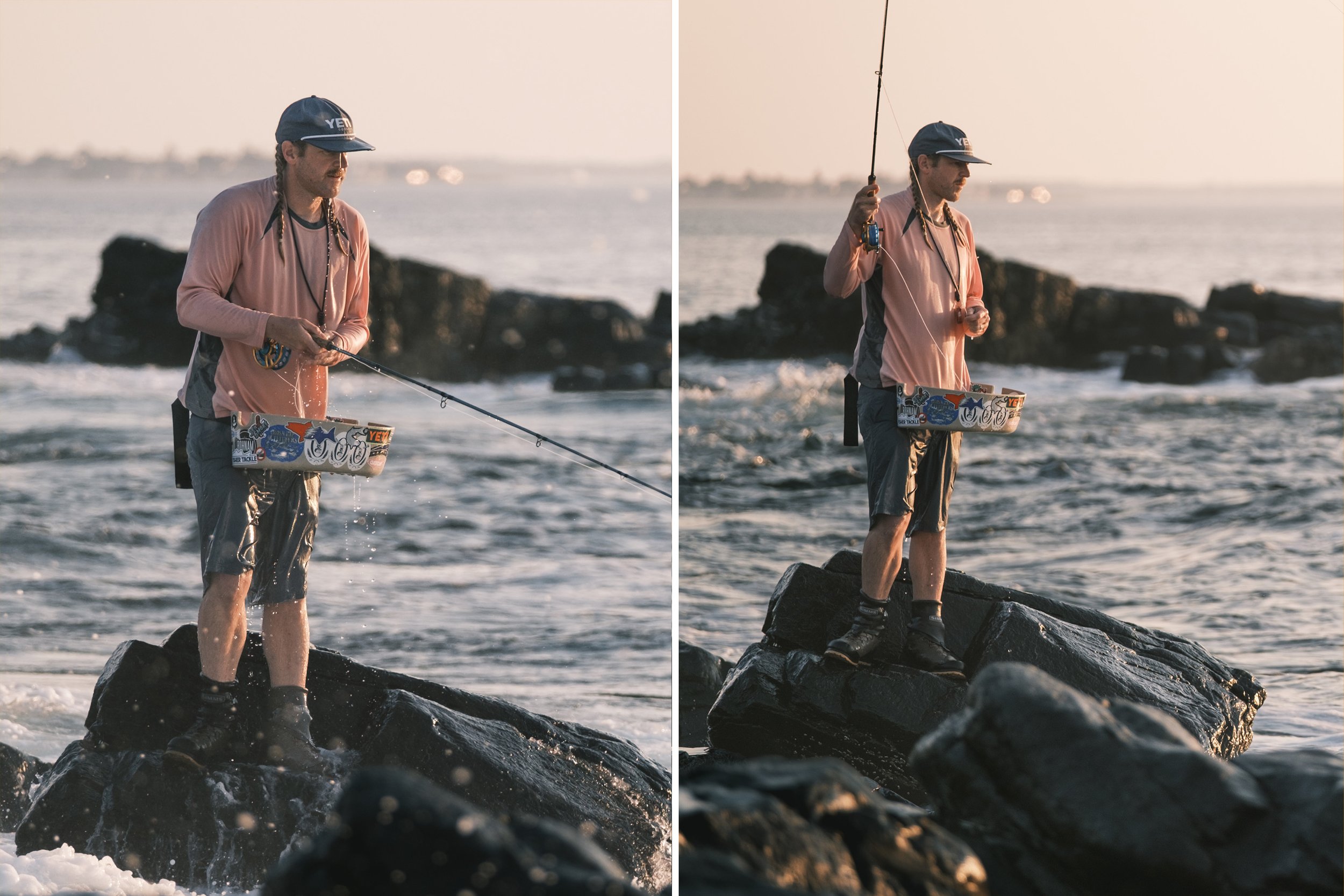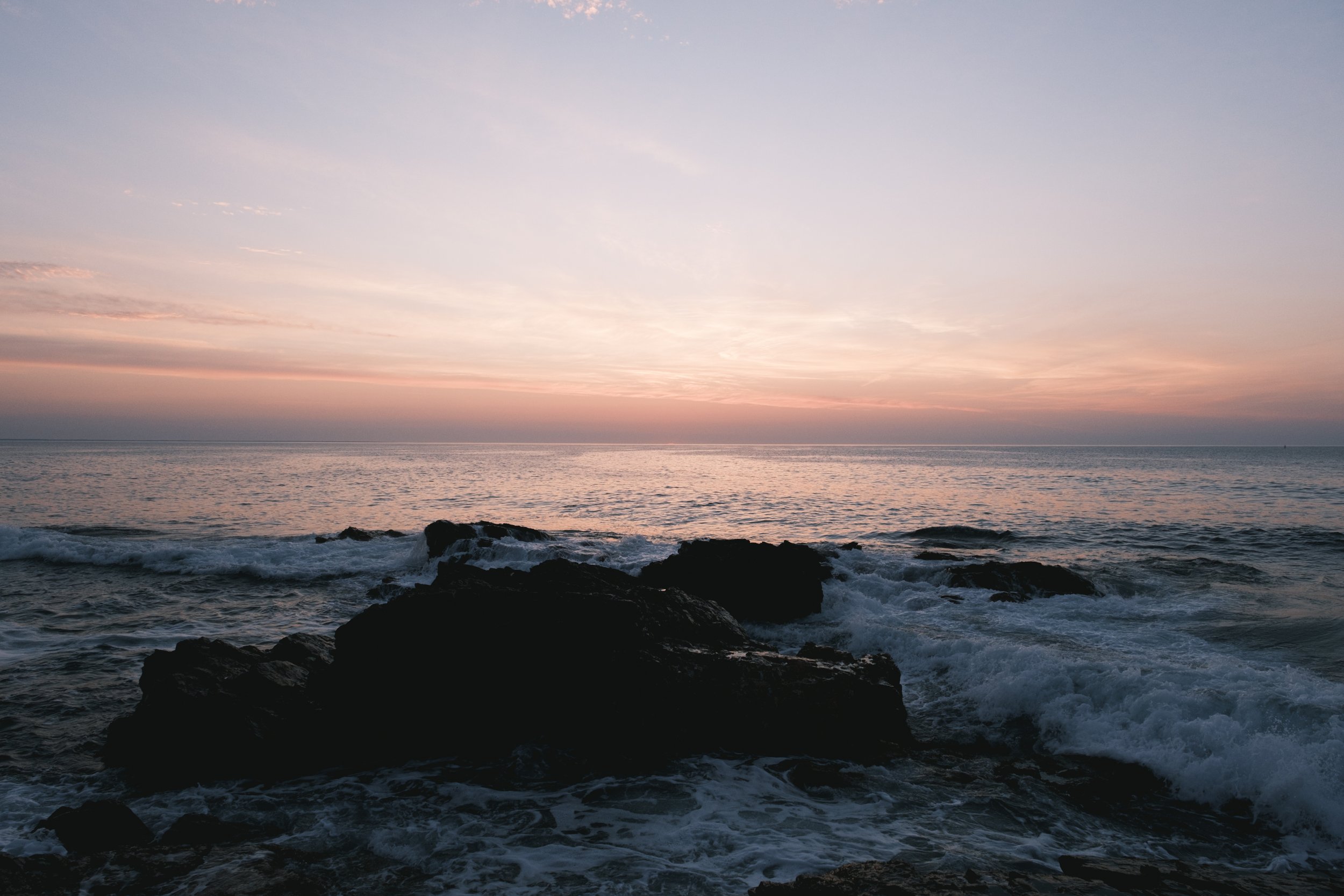Fishing has long been pitched as a way to relax in the great outdoors, but I always thought it was missold. In my experience, it can be a fraught, fiercely territorial business. Anglers guard their fish finders, and may as well lace up their lips with fishing line, so unwilling are they to share the locations of their favorite hot spots. True to form, it’s only at the last minute that the text thread between Oxbow Brewing Company’s founder Tim Adams, photographer Mike Lianza, and myself pings with a Google Map location: a pin dropped at a precise spot on the southern Maine coast, accompanied with a “shhh” emoji. We’d been trying for a week to coax a location out of Adams, and he held off as long as possible for fear of us sharing his secret.
The next day, I leave home at 4 a.m. to ensure I make it to our confidential location well before the first cast and first light. The house is dark, but armed with a headlamp, I manage a couple swipes of cream cheese on a bagel and, failing to locate a travel mug, fill a Solo cup with day-old coffee from the refrigerator. But while I remember sustenance, I forget most of the items I actually need: a change of clothes, proper footwear, and sunglasses.
Once I arrive, Adams gives me a once-over. He asks about everything I forgot, and looks at the popper affixed to my rod, haphazardly tied. “We’ll fix that,” he says, shaking his head.
We are after striped bass this morning. “Stripers,” as they’re known colloquially, rarely venture too far from shore. They travel in schools and feed on the abundance of marine life—including everything from smaller fish and eels to mussels and sea clams—native to the Pine Tree State’s craggy coastline.
The water is at peak high tide during our first cast, splashing and spraying over everything in its path. I find a foothold on the driest boulder available, only to be immediately pummeled by seaspray. The sun peeks over the Atlantic for the first time, a beautiful orange bulb burning through the haze of what will be a humid, 80° summer day.
When I glance over to Adams—alone and decked out in Yeti gear, hair braided like an East Coast Willie Nelson—he casts his fly rod out into the sea like he’s conducting an orchestra, or engaging in a theatrical fencing bout. He looks at home.
“When I get out on the water, when I step on my boat or I put my foot on the sand or whatever, it’s an immediate deep sense of, like, I’m home,” he says later. “[It is a] deep, deep comfort. You know, some people get comfort from comfort food or whatever [...] [W]hen I have that fishing rod in my hands, it’s just like the troubles of the world can melt away.”
Henry David Thoreau once mused, “Men go fishing all of their lives without knowing that it is not fish they are after.” As I recite this quote from memory to Adams after we’ve returned to dry land, he lights up in recognition, and nods behind a Corona and lime. “It’s super accurate,” he says before finding one fault in between sips. “Except I’m fully aware it’s not fish I’m after.”
There’s mounting evidence that time spent communing with nature can improve a person’s mental health, and their cognitive skills. This is true of any outdoor pursuit, particularly those that can be undertaken in solitude. The search for adventure, and for wild connection, can take a person over oceans or atop the highest mountains, but it is also, always, conducted within.
“I think first and foremost is that [connection with nature],” says Adams of his motivations to fish. “The more knowledge you have of the natural world, the more effective an angler you are. It’s a reason to dive deep into your natural surroundings and learn.”
Fishing is a game of managing the vicissitudes of ever-changing ecosystems, tides, lunar cycles, and food chains. The variables include fresh versus saltwater, the temperature of the water, the time of day, and what certain fish are eating (and what eats them) in that location at that time of the year. “If everything aligns and you’re lucky enough to actually catch a fish and you are hooked up to a fish, you are literally connected to the wild,” Adams says.
I have known Adams for more than five years. Our friendship was cemented during numerous visits to Oxbow’s locations in Newcastle and Portland. This is not the first time I’ve written about him, or his love of fishing. Previously, I described Adams as “gregarious, a natural storyteller.” The words “restless” and “peripatetic” were used. Fishing, and the accompanying peace connoted therein, seems antithetical to someone who—at least pre-pandemic—was always traveling, who couldn’t bear more than a passing moment of stillness.
“I think first and foremost is that [connection with nature]. The more knowledge you have of the natural world, the more effective an angler you are. It’s a reason to dive deep into your natural surroundings and learn.”
“I will never master [fishing] in my lifetime,” he says to this question of restlessness. “There’s always more to learn. It may look like I’m just standing there in one place, just putting the fly in the same piece of water or whatever, but I’m thinking about a lot of stuff. I’m trying to solve a problem. And so I don’t feel restless at all. That’s one of the reasons why I like fishing, because I am super freaking restless [in the other parts of my life].”
It’s a good reminder that outward stillness is a bad predictor of internal motion. “I can find great relaxation while also being productive,” he says. “Fishing to me is very meditative ... my thoughts wander and go to various places.” And just like that, we’re back to Thoreau, at least subliminally. As 19th-century Transcendentalist thinkers like Thoreau and Ralph Waldo Emerson described, the journey of self-discovery begins through the act of paying attention, and there is something divine in the simplicity of noticing.
“A lot of creativity comes my way during those moments you get into that kind of deeper, relaxed space,” Adams adds. “And then you kind of shed the noise and some of these other creative ideas will come sneaking out. And I’ve thought of beer ideas, business ideas, life ideas while standing on water.”
Like most Maine kids, Adams grew up, in his words, “skiing in the winter and fishing in the summer.” When his Northeast life was upended and his family moved to Tokyo during his high school years, he swapped striped bass for skateboarding.
Later, back stateside at Colorado College in Colorado Springs, Adams linked up with a fellow undergrad from Arkansas named Cash East. The pair bonded over their similar backgrounds (“Maine is Arkansas with an ocean,” East laughs) and the fact that East was the only other kid Adams knew who had also brought a skateboard to Colorado.
“He had a board, I had a board, so we were both like, ‘Let’s skate,’” says Adams. The two bonded over skateboarding and adventuring across the West. Upon discovering that Adams had grown up fishing in his home state, East promptly set his sights on teaching the Mainer how to fly-fish.
“We’ve fished all across the country. You go in and it’s all you think about, but also you can be assured from hours of very comfortable silence [with a good friend]. It’s a basic pursuit. A lifelong pursuit. Fishing is so much more than a fish pulling on the other end of the line.”
“I can 100% claim credit for getting Tim into fly-fishing,” says East. “One of things we have always talked about is that there’s something common among skateboarders and fly-fishers. Naturally, we end up with a lot of the same interests and outlooks on life, and all of that is expressed [for Tim and I] through fishing.”
East, who now lives and works in Fayetteville, Arkansas, has since developed a deep relationship with Maine, and he estimates that he visits the state five or six times a year to meet with Adams. Though they ostensibly discuss business (East is an investor in Oxbow), the two also set aside time to head into nature. They call it “going feral.”
“It just basically means, ‘Cash is headed to Maine and we’re going to disappear for a week and fish,’” East says.
As someone with a vested interest in Oxbow’s success, too, East shares admiration for Adams’ approach to both brewing and fishing. He “makes beer the way he casts a fly rod: He thinks about it, he loves it, and he always wants to get better,” he says.
“We’ve fished all across the country,” East continues. “You go in and it’s all you think about, but also you can be assured from hours of very comfortable silence [with a good friend]. It’s a basic pursuit. A lifelong pursuit. Fishing is so much more than a fish pulling on the other end of the line.”
In a world where the demands on our time are magnified by constant connectivity, Adams cherishes his ability to unplug. There’s no texting, social media surfing, or work emails when he’s on the water. “There’s nothing digital about the way I fish,” he says.
The same is true of his need to escape the demands of the brewing life. His work schedule is populated with tap takeovers and international festivals. There are industry parties, industry bars, post-party gatherings, and an accompanying pressure to be both present and “on” at all times. Downtime can often just mean a different night at a different bar with the same people.
“I was more into that when I was younger and when Oxbow was younger,” Adams says. “Maybe I just hadn’t hit my capacity [for that] yet. [Now I have] to preserve my energy for when those times do happen, when I need to be very sociable, you know, I’ve got a full tank. So, I need to sneak off into the woods or the beach.”
“I love the weird little subculture that’s forming with all these folks that fish. Everyone [in beer] is mostly content to talk about beer, but there is a small gang of us and we kind of like the conversation to steer somewhere else. [We are] quietly suggesting that fishing is more important to us.”
Adams isn’t alone. He’s found a kinship with many brewers who spend their time on the water, including Jake Miller at Tulsa, Oklahoma’s Heirloom Rustic Ales.
“I love the weird little subculture that’s forming with all these folks that fish,” Miller says. “Everyone [in beer] is mostly content to talk about beer, but there is a small gang of us and we kind of like the conversation to steer somewhere else. [We are] quietly suggesting that fishing is more important to us.”
Miller and Adams began their fishing friendship in Portland, Maine, when Miller was in town for the Pils & Love Festival. Adams outfitted Miller and Colin Lenfesty of Seattle, Washington’s Holy Mountain Brewing Company with a guide who took the pair fishing from 4 a.m. to 1 p.m. and rolled them right to the festival via the water. “Just catching stripers and drinking the best Pilsners in the world,” Miller reminisces.
Despite Miller’s standing rule that he won’t do a collaboration beer without a fishing day attached to it, Heirloom and Oxbow haven’t penned any recipes together yet because, according to Miller, it would “take time away from the water.”
Miller visited Maine last summer for the inaugural All Species Fly Fishing Tournament (hosted by Oxbow), but both brewers yearn for a larger tidal pool of bass-seeking beer makers. “I want to meet [...] more brewing anglers as well,” says Adams. “We need to know each other and stick together and have a beer festival of just angling brewers, so that we can have an excuse to all go fish together.”
“We want to put that exact festival together,” adds Miller. “We can have rotating locations. A brewer that has a spot and can put you on some serious fish. It’s a lot of planning and execution, but it’s gonna happen. There are too many brewers who are over the festival game.”
Increasingly knitting those worlds together is one of Adams’ goals for the future.
“I wanna blur those lines so much more than I am able to,” he says. “When I went down to Florida for the Foeder for Thought festival, the day before the festival, people were going out and hitting the bars and everything like that. But I actually found a fishing guide that was down to go out at night.” Adams met him at the dock at 9 p.m., and the two motored out onto a deserted Tampa Bay.
“It was me and this dude who were out there until like 1 in the morning hammering snook,” he remembers. “And then I caught my first tarpon at midnight. That was cool. I was able to sneak that in, and what I’d like to be able to do is double dip more in the future.”
Attempting to live vicariously through Adams, I ask about his favorite fishing trip. He fondly recalls a visit to the Bahamas.
“I had my most exotic fishing trip last year, which was amazing,” he says. “My friend has a lodge down there. I’d never done any Caribbean stuff before. It just blew my mind. You’re out on these sand flats and you’re seeing these bonefish from hundreds of yards away.”
There’s an oft-repeated adage in beer that the best beer is “the one in your hand” or “the cold one that’s close to you.” That is, when we talk about superlatives, often it’s much more appropriate to settle into the moment you’re in rather than become wistful about past experiences. And so Adams and I turn our thoughts away from the Caribbean, and towards the morning we’d just spent on the Maine coast.
Pre-dawn, we camped our cars in the shade on a lonely side street surrounded by colossal coastal homes covered by salt-worn cedar planks, their BMWs parked in gravel driveways. There’s an immensity to standing on the shoreline before the rest of the world awakens. The quietude and desolation amplify the grandeur of the landscape, and the siren song that compels us—and has compelled us for millennia—toward the sea echoes across time.
Standing as a trio down below the well-trodden path convinced us that this little cove and this stretch of coastline and this moment belonged solely to us, however temporarily. In the chaos of our lives, it’s easy to overlook how close we all are to something so majestic.
In the end, it’s true about the wanderer who searches far and wide, only to conclude the journey at home. “For me, it’s Maine,” Adams says. “The best spot is the spot that’s near you, that you can get to and just actually go fishing.”



























